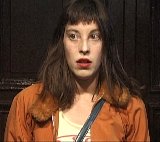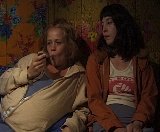 |
Vol 2, No 8
28 February 2000 |
|
|
Broken by the Streets Maren-Kea Freese's Zoe Elke de Wit The most striking thing about Maren-Kea Freese's Zoe (1999) is the lead actress Kirsten Hartung in the title role. Her eyes are so large they somehow fill the screen and linger in your memory long after the final titles. After many stage appearances, this is her first film and it makes for a remarkable debut. Zoe is a "normal" young woman living life according to what she wants - in this case, to be a DJ. As she gets little work, she doesn't have enough money for rent and is at the mercy of her boyfriend, friends (when she falls out with her boyfriend), near strangers (when friends no longer tolerate her) and finally life on the streets. She moves around with all her possessions in a few carrier bags. In the final downward spiral, sequences speed up to the accompaniment of manic drum and base music.
The only time Zoe does seem to become affected by her lack of success and security in life is when she discovers that her mother has died and decides to go on a futile search of her past. Broken families, broken people At the Berlin Film Festival, Freese told me how she came to write the script: "I always start with a 'feeling' and for me there is a feeling of shall we say rootlessness. Times when there is nothing to hold onto." In order to try and express this, she started her research amongst the homeless. Initially, she thought she might find a lead actress there, but soon realised that most people she met were already too broken. Only in the final sequences does she use non-professional homeless actors, most of them belonging to a theatre group set up by the homeless for the homeless.
Zoe won the Best New Director award at the 1999 Munich Film Festival, and one feels that with homelessness and the break-up of the traditional family ever on the increase, this slick but grainy and gritty production should travel easily beyond Germany's borders. Zoe is a compelling film, and although the overriding theme is lonely and sad, brighter and humorous moments do surface. Slick editing, production, acting and directorial skills hold your attention right until the end - but do not expect to leave the cinema skipping. Elke de Wit, 28 February 2000
|
|
![]()
Copyright © 2000 - Central Europe Review and Internet servis, a.s.
All Rights
Reserved


